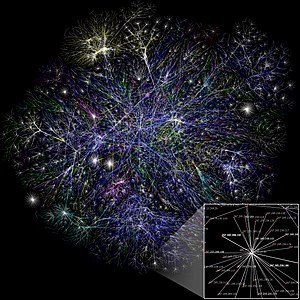
Back بوابة:إنترنت Arabic دەروازە:ئینتەرنێت CKB Portál:Internet Czech Portal:Internet German Portal:Internet Spanish درگاه:اینترنت Persian Portail:Internet French פורטל:אינטרנט HE Պորտալ:Համացանց Armenian Portal:Internet ID
The Internet PortalThe Internet (or internet) is the global system of interconnected computer networks that uses the Internet protocol suite (TCP/IP) to communicate between networks and devices. It is a network of networks that consists of private, public, academic, business, and government networks of local to global scope, linked by a broad array of electronic, wireless, and optical networking technologies. The Internet carries a vast range of information resources and services, such as the interlinked hypertext documents and applications of the World Wide Web (WWW), electronic mail, telephony, and file sharing. The origins of the Internet date back to research that enabled the time-sharing of computer resources and the development of packet switching in the 1960s. The set of rules (communication protocols) to enable internetworking on the Internet arose from research and development commissioned in the 1970s by the Defense Advanced Research Projects Agency (DARPA) of the United States Department of Defense in collaboration with universities and researchers across the United States and in the United Kingdom and France. The ARPANET initially served as a backbone for the interconnection of regional academic and military networks in the United States to enable resource sharing. The funding of the National Science Foundation Network as a new backbone in the 1980s, as well as private funding for other commercial extensions, encouraged worldwide participation in the development of new networking technologies and the merger of many networks using DARPA's Internet protocol suite. The linking of commercial networks and enterprises by the early 1990s, as well as the advent of the World Wide Web, marked the beginning of the transition to the modern Internet, and generated sustained exponential growth as generations of institutional, personal, and mobile computers were connected to the network. Although the Internet was widely used by academia in the 1980s, the subsequent commercialization in the 1990s and beyond incorporated its services and technologies into virtually every aspect of modern life. (Full article...) Selected article
The AACS encryption key controversy, also known as the AACS cryptographic key controversy, arose in April 2007 when the Motion Picture Association of America and the Advanced Access Content System Licensing Administrator, LLC (AACS LA) began issuing demand letters to websites publishing a 128-bit number, represented in hexadecimal as 09 F9 11 02 9D 74 E3 5B D8 41 56 C5 63 56 88 C0 (commonly referred to as 09 F9), which is one of the cryptographic keys for HD DVDs and Blu-ray Discs. The letters demanded the immediate removal of the key and any links to it, citing the anti-circumvention provisions of the U.S. Digital Millennium Copyright Act (DMCA). In response to widespread internet postings of the key, the AACS LA issued various press statements, praising those websites that complied with their requests as acting in a "responsible manner", warning that "legal and technical tools" were adapting to the situation. The controversy was further escalated in early May 2007, when aggregate news site Digg received a DMCA cease and desist notice and then removed numerous articles on the matter and banned users reposting the information. This sparked what some describe as a digital revolt, or "cyber-riot", in which users posted and spread the key throughout the internet en masse. The AACS LA described this situation as an "interesting new twist".
Selected pictureNews
Wikinews Internet portal
WikiProjects
Did you know (auto-generated) -
Selected biography
Kim Karin Polese (born November 13, 1961) was president and CEO of Marimba, Inc. from 1996 until July 2000, and was one of the most prominent Silicon Valley executives during the dot-com era. In 1997, she made Time's list of "The 25 Most Influential Americans". Polese spent more than seven years with Sun Microsystems working as a Java product manager, before embarking on Marimba's Java-based business. Before joining Sun, she worked at IntelliCorp Inc. As of September 2004, Polese is CEO of SpikeSource, a provider of business-ready open source solutions. The company was incubated in 2003 at VC firm Kleiner Perkins Caufield & Byers by Ray Lane, and launched its first products in April 2005. Polese serves on the boards of Technorati, Inc., the Global Security Institute, and the University of California President's Board on Science and Innovation. Polese is a fellow at Carnegie Mellon University's Center for Engineered Innovation. She received a BA degree in biophysics in 1984 from the University of California, Berkeley and studied Computer Science at the University of Washington.
General images -The following are images from various internet-related articles on Wikipedia.
Selected quoteMore Did you know...
Main topics
Featured contentCategoriesRelated portalsThings you can do
Associated WikimediaThe following Wikimedia Foundation sister projects provide more on this subject:
Wikipedia's portals |






















































